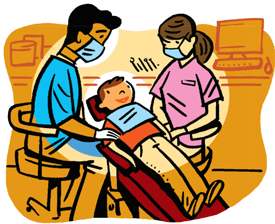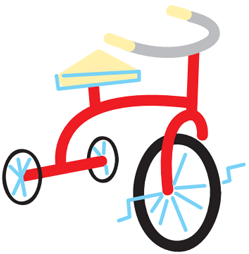Nitrous Oxide
Often called “laughing gas,” nitrous oxide is a very safe, mild sedative that will help your child remain relaxed during dental procedures. Your child’s dentist will give the sedation with the use of a “space mask,” which carries air (oxygen) mixed with the medication. Your child will be asked to breathe through the nose, not the mouth, and will sense a faint, sweet smell. The sedation will take effect in about 5 minutes. The mask will remain in place until the procedure is done. Your child will be awake during the entire procedure and may have a “happy” feeling. When the procedure is complete, the nitrous oxide will be turned off and your child will breathe in pure oxygen for about 5 minutes to clear out any remaining gas. You should limit your child to a very light meal before this procedure, such as toast or a bagel.
Oral Sedatives
If your child is nervous, oral sedation may be used. It is taken by mouth or through the nose. This type of medicine will make your child a little drowsy, and will keep him or her relaxed and calm during the procedure. The medicine usually begins to work within 20 minutes. Your dentist will have your child take the medicine once you arrive at the appointment. If your child is having sedation, he or she should have nothing to eat or drink after midnight the night before the appointment.
IV Sedation
Intravenous (IV) sedation requires a needle to be inserted into your child’s vein, usually in the arm or hand. The biggest advantage to IV sedation is that the dentist can give your child more medicine during a longer procedure to keep him or her relaxed. Home preparation is required for this type of sedation.









 At
At  When sedation is needed, there are important rules for eating and drinking that must be followed in the hours before the procedure. One business day before your child’s procedure, you will receive a phone call from the Dental Clinic. Calls are not made on weekends or holidays. Please have a pen and paper ready to write down these important instructions.
When sedation is needed, there are important rules for eating and drinking that must be followed in the hours before the procedure. One business day before your child’s procedure, you will receive a phone call from the Dental Clinic. Calls are not made on weekends or holidays. Please have a pen and paper ready to write down these important instructions. 